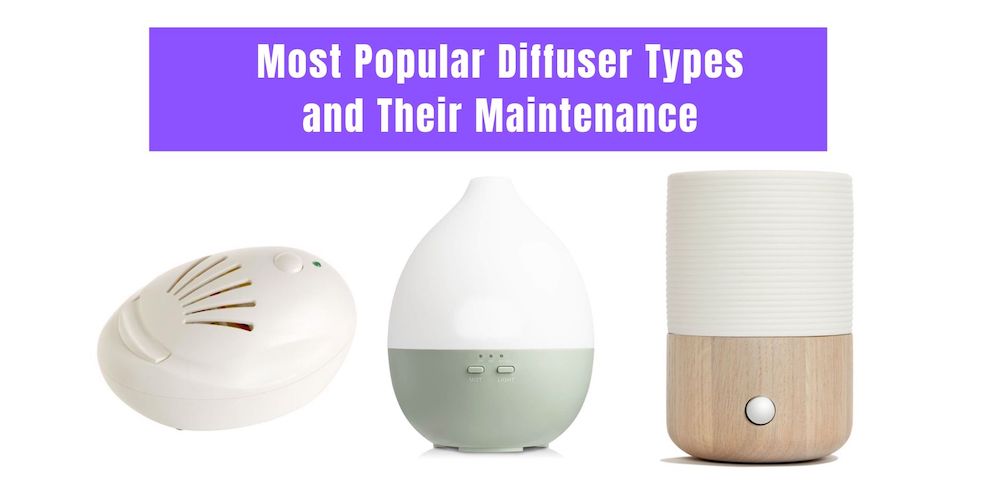A Diffuser is any device which allows a liquid to evaporate thereby putting a scent into the surrounding environment. The process of diffusion is typically accomplished in 4 different ways:
(1) Heat —by applying heat, either through burning a candle, or by using an electrically heated vaporizer, the increased temperature will cause the essential oil to evaporate into the air.

(2) Ventilation—by utilizing a small fan to create airflow, evaporation is achieved when air passes over a wick or absorbent pad which holds the essential oil.

(3) Humidification —by using water and essential oil mixed together, a mist can be formed which will fill the air. This mist is produced usually ultrasonic waves of energy.

(4) Nebulization ( —Is a process which forces the break down of essential oils into very tiny particles. It requires a high velocity, pressurized air stream and a specially designed jet nozzle. The rate of evaporation is highly accelerated and occurs almost instantly.

So, a diffuser is simply any device that imparts a scent into the air by evaporation.
Diffuser can be categorized into:
Heat Diffuser – Great for spreading a lovely scent throughout your home, heat diffusion is best for pretty smells only. If you are wanting the therapeutic properties of essential oils then heat should be avoided. Heat alters the chemistry of the oil, removing any therapeutic properties it might have had.
Ultrasonic Diffuser – This diffuser uses electronic frequencies to create vibrations in water, that are carried to the surface where the essential oils are floating. The vibrations vaporize the essential oils and disperse them into the air without using any kind of heat at all. Unlike heat diffusers, these do not destroy the therapeutic properties of the essential oils being used. These diffusers do a great job of purifying the air and removing unwanted odors! Using a ultrasonic diffuser may produce a nice scent, but has very limited healing capacity since the amount of essential oil is so small.
Evaporative Diffuser – Evaporative diffusers are very basic in operation compared to ultrasonic diffusers. A fan blows air through a pad or filter where the oil sits and vaporizes the oil on the pad. The biggest problem with evaporative diffusers, is that the lighter oils (top notes such as citrus) diffuse off quicker than the heavier oils (base notes). Compared to the other diffusers, these aren’t as great for therapeutic use in large rooms, but are great for personal use in your vehicle or when traveling!
Nebulizer/Cold Air Diffuser – It uses room-temperature air to blow essential oils into a nebulizer to be vaporized into the air. This diffuser can diffuse quickly and efficiently; Some diffusers of this type can not effectively diffuse heavier, thicker essential oils and can be hard to clean. Unlike heat diffusers, these do not destroy the therapeutic properties of the essential oils being used. It is absolutely the best way to provide both aroma and therapeutic healing value with essential oils. It does not alter the chemical composition of the oils. It breaks down pure essential oil molecules without separation of the mixture. It produces a particle size small enough for the lungs and body to absorb them rapidly.Since nebulizing diffusers work so powerfully to quickly saturate the air with essential oils, they generally run at a higher sound level, and tend to use essential oils at a higher rate than any other type of diffuser.
The diffusion method you choose, will determine to a large degree, the amount of aroma and therapeutic benefit you receive from an essential oil.
For example, if we use heat to evaporate the essential oil, it will gently produce a scent and fill the room nicely. However, heat has 2 drawbacks. First, it tends to alter the chemical composition of the essential oil which can destroy it’s purity and therapeutic value. Second, while heat does produce a nice aroma, it may not be therapeutically useful. The size and availability of breathable molecules are mostly filtered out by the nose hairs and nasal cavity.
In conclusion, if all you want to do is provide a pleasant scent to your environment, ultrasonic diffuser will work fine and can cover either a bedroom or living room. But if you want to use essential oils for their maximum healing qualities and pure therapeutic benefit, only a nebulizer will do the job correctly and effectively.This is why doctors and respiratory professionals prescribe the use of a nebulizer to administer inhalants of a medicinal or therapeutic nature.

